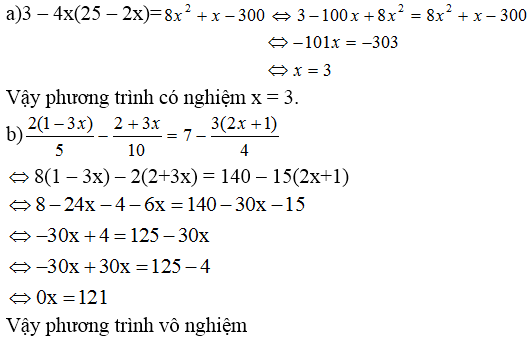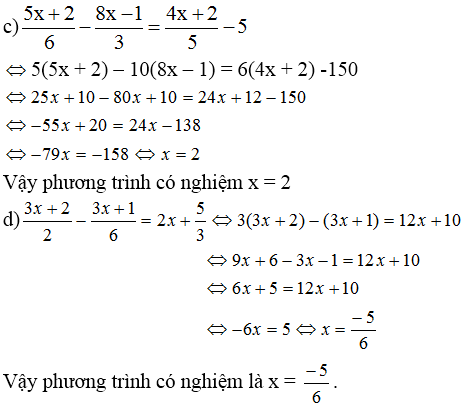Hãy nhập câu hỏi của bạn vào đây, nếu là tài khoản VIP, bạn sẽ được ưu tiên trả lời.

3x.|x+1|−2x|x+2|=12
Với x < -2 ta có: 3x.(-x-1)-2x(-x-2)-12=0
<=> -3x2 - 3x + 2x2 + 4x -12 =0
<=> -x2 - x - 12=0
$\Leftrightarrow $ -(x2 +x+12)=0 ( vô lý)
Làm tương tự với 2 trường hợp còn lại:

\(\Leftrightarrow\) \(\dfrac{7}{8x}\)+\(\dfrac{5-x}{4x\left(x-2\right)}\)= \(\dfrac{x-1}{2x\left(x-2\right)}\)+ \(\dfrac{1}{8\left(x-2\right)}\)
\(\Rightarrow\) 7(x-2) + 2(5-x) = 4(x-1) +x
\(\Leftrightarrow\) 7x-2x+10-2x= 4x-4+x
\(\Leftrightarrow\)7x-2x-2x-4x-x = -4-10
\(\Leftrightarrow\) -2x = -14
\(\Leftrightarrow\) x = 7
Vậy phương trình có nghiệm x=7
![]()
⇔ 78x78x+5−x4x(x−2)5−x4x(x−2)= x−12x(x−2)x−12x(x−2)+ 18(x−2)18(x−2)
⇔ 7(x-2)8x(x-2)78x+2(5−x)8x(x−2)5−x4x(x−2)= 4(x−1)28x(x−2)x−12x(x−2)+ x8x(x−2)
18(x−2)
⇒7(x-2)+2(5-x)=4(x-1)+x
⇔ 7x-2x+10-2x= 4x-4+x
⇔7x-2x-2x-4x-x = -4-10
⇔ -2x = -14
⇔ x = 7
vậy tập của phương trình là: S=7}

b: Đặt \(x^2-6x-2=a\)
Theo đề, ta có: \(a+\dfrac{14}{a+9}=0\)
=>(a+2)(a+7)=0
\(\Leftrightarrow\left(x^2-6x\right)\left(x^2-6x+5\right)=0\)
=>x(x-6)(x-1)(x-5)=0
hay \(x\in\left\{0;1;6;5\right\}\)
c: \(\Leftrightarrow\dfrac{-8x^2}{3\left(2x-1\right)\left(2x+1\right)}=\dfrac{2x}{3\left(2x-1\right)}-\dfrac{8x+1}{4\left(2x+1\right)}\)
\(\Leftrightarrow-32x^2=8x\left(2x+1\right)-3\left(8x+1\right)\left(2x-1\right)\)
\(\Leftrightarrow-32x^2=16x^2+8x-3\left(16x^2-8x+2x-1\right)\)
\(\Leftrightarrow-48x^2=8x-48x^2+18x+3\)
=>26x=-3
hay x=-3/26

ĐKXĐ: x∉{0;2}
Ta có: \(\frac{5-x}{4x^2-8x}+\frac{7}{8x}=\frac{x-1}{2x\left(x-2\right)}+\frac{1}{8x-16}\)
\(\Leftrightarrow\frac{5-x}{4x\left(x-2\right)}+\frac{7}{8x}-\frac{x-1}{2x\left(x-2\right)}-\frac{1}{8\left(x-2\right)}=0\)
\(\Leftrightarrow\frac{2\left(5-x\right)}{8x\left(x-2\right)}+\frac{7\left(x-2\right)}{8x\left(x-2\right)}-\frac{4\left(x-1\right)}{8x\left(x-2\right)}-\frac{x}{8x\left(x-2\right)}=0\)
Suy ra: \(10-2x+7x-14-4x+4-x=0\)
\(\Leftrightarrow0x=0\)
Vậy: \(\left\{{}\begin{matrix}x\in R\\x\notin\left\{0;2\right\}\end{matrix}\right.\)

1. ĐKXĐ: $x\neq 1$
Sửa lại đề 1 chút:
$\frac{1}{x-1}-\frac{3x^2}{x^3-1}=\frac{2x}{x^2+x+1}$
$\Leftrightarrow \frac{x^2+x+1}{(x-1)(x^2+x+1)}-\frac{3x^2}{(x-1)(x^2+x+1)}=\frac{2x(x-1)}{(x-1)(x^2+x+1)}$
$\Leftrightarrow x^2+x+1-3x^2=2x(x-1)$
$\Leftrightarrow 4x^2-3x-1=0$
$\Leftrightarrow (4x+1)(x-1)=0$
Vì $x\neq 1$ nên $x=-\frac{1}{4}$
2. ĐKXĐ: $x\neq 0;2$
PT \(\Leftrightarrow \frac{7}{8x}+\frac{5-x}{4x(x-2)}=\frac{x-1}{2x(x-2)}+\frac{1}{8(x-2)}\)
\(\Leftrightarrow \frac{7(x-2)}{8x(x-2)}+\frac{2(5-x)}{8x(x-2)}=\frac{4(x-1)}{8x(x-2)}+\frac{x}{8x(x-2)}\)
\(\Leftrightarrow 7(x-2)+2(5-x)=4(x-1)+x\)
\(\Leftrightarrow 5x-4=5x-4\) (luôn đúng)
Vậy pt có nghiệm $x\in\mathbb{R}$ với $x\neq 0;2$

a)\(\dfrac{3x+2}{3x-2}-\dfrac{6}{2+3x}=\dfrac{9x^2}{9x^2-4}\left(ĐKXĐ:x\ne\pm\dfrac{2}{3}\right)\)
\(\Leftrightarrow\dfrac{3x+2}{3x-2}-\dfrac{6}{3x+2}=\dfrac{9x^2}{\left(3x-2\right)\left(3x+2\right)}\)
\(\Leftrightarrow\dfrac{\left(3x+2\right)^2-6\left(3x-2\right)}{\left(3x-2\right)\left(3x+2\right)}=\dfrac{9x^2}{\left(3x-2\right)\left(3x+2\right)}\)
\(\Rightarrow9x^2+12x+4-18x+12=9x^2\)
\(\Leftrightarrow9x^2-6x+16-9x^2=0\)
\(\Leftrightarrow-6x=-16\)
\(\Leftrightarrow x=\dfrac{8}{3}\) (thỏa mãn ĐKXĐ)
Vậy .................
b) \(\dfrac{5-x}{4x^2-8x}+\dfrac{7}{8x}=\dfrac{x-1}{2x\left(x-2\right)}+\dfrac{1}{8x-16}\left(ĐKXĐ:x\ne0;x\ne2\right)\)
\(\Leftrightarrow\dfrac{5-x}{4x\left(x-2\right)}+\dfrac{7}{8x}=\dfrac{x-1}{2x\left(x-2\right)}+\dfrac{1}{8\left(x-2\right)}\)
\(\Leftrightarrow\dfrac{2\left(5-x\right)+7\left(x-2\right)}{8x\left(x-2\right)}=\dfrac{4\left(x-1\right)+x}{8x\left(x-2\right)}\)
\(\Rightarrow10-2x+7x-14=4x-4+x\)
\(\Leftrightarrow5x-4=5x-4\)
\(\Leftrightarrow0x=0\) (vô số nghiệm)
Vậy \(S=R\backslash\left\{0;2\right\}\)

giải pt sau
g) 11+8x-3=5x-3+x
\(\Leftrightarrow\) 8x + 8 = 6x - 3
<=> 8x-6x = -3 - 8
<=> 2x = -11
=> x=-\(\dfrac{11}{2}\)
Vậy tập nghiệm của PT là : S={\(-\dfrac{11}{2}\)}
h)4-2x+15=9x+4-2x
<=> 19 - 2x = 7x + 4
<=> -2x - 7x = 4 - 19
<=> -9x = -15
=> x=\(\dfrac{15}{9}=\dfrac{5}{3}\)
Vậy tập nghiệm của pt là : S={\(\dfrac{5}{3}\)}
g)\(\dfrac{3x+2}{2}-\dfrac{3x+1}{6}=\dfrac{5}{3}+2x\)
<=> \(\dfrac{3\left(3x+2\right)}{6}-\dfrac{3x+1}{6}=\dfrac{5.2+6.2x}{6}\)
<=> 9x + 6 - 3x + 1 = 10 + 12x
<=> 6x + 7 = 10 + 12x
<=> 6x -12x = 10-7
<=> -6x = 3
=> x= \(-\dfrac{1}{2}\)
Vậy tập nghiệm của PT là : S={\(-\dfrac{1}{2}\)}
\(h,\dfrac{x+4}{5}-x+4=\dfrac{4x+2}{5}-5\)
<=> \(\dfrac{x+4-5\left(x+4\right)}{5}=\dfrac{4x+2-5.5}{5}\)
<=> x + 4 - 5x - 20 = 4x + 2 - 25
<=> x - 5x - 4x = 2-25-4+20
<=> -8x = -7
=> x= \(\dfrac{7}{8}\)
Vậy tập nghiệm của PT là S={\(\dfrac{7}{8}\)}
\(i,\dfrac{4x+3}{5}-\dfrac{6x-2}{7}=\dfrac{5x+4}{3}+3\)
<=> \(\dfrac{21\left(4x+3\right)}{105}\)-\(\dfrac{15\left(6x-2\right)}{105}\)=\(\dfrac{35\left(5x+4\right)+3.105}{105}\)
<=> 84x + 63 - 90x + 30 = 175x + 140 + 315
<=> 84x - 90x - 175x = 140 + 315 - 63 - 30
<=> -181x = 362
=> x = -2
Vậy tập nghiệm của PT là : S={-2}
K) \(\dfrac{5x+2}{6}-\dfrac{8x-1}{3}=\dfrac{4x+2}{5}-5\)
<=> \(\dfrac{5\left(5x+2\right)}{30}-\dfrac{10\left(8x-1\right)}{30}=\dfrac{6\left(4x+2\right)-150}{30}\)
<=> 25x + 10 - 80x - 10 = 24x + 12 - 150
<=> -55x = 24x - 138
<=> -55x - 24x = -138
=> -79x = -138
=> x=\(\dfrac{138}{79}\)
Vậy tập nghiệm của PT là S={\(\dfrac{138}{79}\)}
m) \(\dfrac{2x-1}{5}-\dfrac{x-2}{3}=\dfrac{x+7}{15}\)
<=> \(\dfrac{3\left(2x-1\right)-5\left(x-2\right)}{15}=\dfrac{x+7}{15}\)
<=> 6x - 3 - 5x + 10 = x+7
<=> x + 7 = x+7
<=> 0x = 0
=> PT vô nghiệm
Vậy S=\(\varnothing\)
n)\(\dfrac{1}{4}\left(x+3\right)=3-\dfrac{1}{2}\left(x+1\right)-\dfrac{1}{3}\left(x+2\right)\)
<=> \(\dfrac{1}{4}x+\dfrac{3}{4}=3-\dfrac{1}{2}x-\dfrac{1}{2}-\dfrac{1}{3}x-\dfrac{2}{3}\)
<=> \(\dfrac{1}{4}x+\dfrac{1}{2}x+\dfrac{1}{3}x=3-\dfrac{1}{2}-\dfrac{2}{3}-\dfrac{3}{4}\)
<=> \(\dfrac{13}{12}x=\dfrac{13}{12}\)
=> x= 1
Vậy S={1}
p) \(\dfrac{x}{3}-\dfrac{2x+1}{6}=\dfrac{x}{6}-6\)
<=> \(\dfrac{2x-2x+1}{6}=\dfrac{x-36}{6}\)
<=> 2x -2x + 1= x-36
<=> 2x-2x-x = -37
=> x = 37
Vậy S={37}
q) \(\dfrac{2+x}{5}-0,5x=\dfrac{1-2x}{4}+0,25\)
<=> \(\dfrac{4\left(2+x\right)-20.0,5x}{20}=\dfrac{5\left(1-2x\right)+20.0,25}{20}\)
<=> 8 + 4x - 10x = 5 - 10x + 5
<=> 4x-10x + 10x = 5+5-8
<=> 4x = 2
=> x= \(\dfrac{1}{2}\)
Vậy S={\(\dfrac{1}{2}\)}
g) \(11+8x-3=5x-3+x\)
\(\Leftrightarrow8+8x=6x-3\)
\(\Leftrightarrow8x-6x=-3-8\)
\(\Leftrightarrow2x=-11\)
\(\Leftrightarrow x=-\dfrac{11}{2}\)
h, \(4-2x+15=9x+4-2x\)
\(\Leftrightarrow-2x-9x+2x=4-4-15\)
\(\Leftrightarrow-9x=-15\)
\(\Leftrightarrow x=\dfrac{-15}{-9}=\dfrac{5}{3}\)

a: \(\Leftrightarrow-12x-4=8x-2-8-6x\)
=>-12x-4=2x-10
=>-14x=-6
hay x=3/7
b: \(\Leftrightarrow3\left(5x-3\right)-2\left(5x-1\right)=-4\)
=>15x-9-10x+2=-4
=>5x-7=-4
=>5x=3
hay x=3/5(loại)
c: \(\Leftrightarrow x^2-4+3x+3=3+x^2-x-2\)
\(\Leftrightarrow x^2+3x-1=x^2-x+1\)
=>4x=2
hay x=1/2(nhận)




\(\dfrac{7}{8x}+\dfrac{5-x}{4x^2-8x}=\dfrac{x-1}{2x\left(x-2\right)}+\dfrac{1}{8x-16}\)
ĐKXĐ: x ≠ 0; x ≠ 2
\(< =>\dfrac{14x-28+20-4x}{16x\left(x-2\right)}=\dfrac{8x-8+2x}{16x\left(x-2\right)}\)
Suy ra: 14x - 28 + 20 - 4x = 8x - 8 + 2x
<=> 14x - 8x - 2x - 4x = 28 - 20 - 8
<=> 0x = 0
Vậy: S = { x | x ≠ 0;2 }